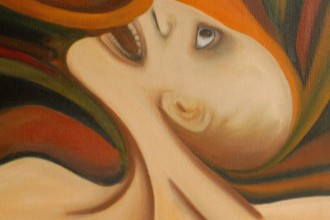The frayed but still consistent relationship between creation and censorship.
By Sana Hussain
 As 2012 drew to a close, Literature Nobel Prize winner Mo Yan sparked controversy in the literary world by saying that censorship is a must. During a news conference in Stockholm he said that censorship should not stand in the way of truth, but that any rumors or defamation “should be censoredâ€. Not offering much consolation he added that he hoped that “censorship, per se, should have the highest principleâ€. Considering his political affiliations and stance on human rights, his advocacy for censorship as a necessary evil may not be altogether surprising, but it is disconcerting nonetheless. The irony of the situation is also too obvious to ignore when Yan pronounces censorship “necessary†in the same breath with which he says “I have always been independent. When someone forces me to do something I don’t do itâ€[1].
As 2012 drew to a close, Literature Nobel Prize winner Mo Yan sparked controversy in the literary world by saying that censorship is a must. During a news conference in Stockholm he said that censorship should not stand in the way of truth, but that any rumors or defamation “should be censoredâ€. Not offering much consolation he added that he hoped that “censorship, per se, should have the highest principleâ€. Considering his political affiliations and stance on human rights, his advocacy for censorship as a necessary evil may not be altogether surprising, but it is disconcerting nonetheless. The irony of the situation is also too obvious to ignore when Yan pronounces censorship “necessary†in the same breath with which he says “I have always been independent. When someone forces me to do something I don’t do itâ€[1].
When a writer and intellectual of the 21st century draws an affinity between censorship and airport security checks, it raises questions regarding his eligibility for an honor whose previous recipients include iconoclasts like Bertrand Russell, Jean Paul Sartre, George Bernard Shaw, Samuel Beckett, and Toni Morrison. Following his statements “celebrating†censorship, Yan has garnered opprobrium from many writers including the Nobel laureate Herta Muller, and also Salman Rushdie; a writer, who more than anyone else today, is aware of the perils of censorship, having a bounty placed on him following the publication of the infamous Satanic Verses. Rushdie’s book was consequently banned in several countries including South Africa, Sri Lanka, India, Singapore, Pakistan, Bangladesh, Sudan and Thailand. For all the indignation and protest surrounding Rushdie’s work, it seems odd that some of the West’s more canonical works that are at the core of its culture and are written in the same vein as Satanic Verses, remain ignored in the censorship discourse.
While an individual or a community may not agree with the views and opinions of the other, taking away the right to express those opinions is not only wrong but also serves no purpose. Opposing ideas do not always threaten the existence of old ones – they only allow room for debate and food for thought. Contrary to what many believe Dante’s writings despite being hostile to the sensibilities of many, did not harm or cause any lasting debilitating effect on any of them. What’s more, progressive individuals like Harold Bloom and Oscar Wilde admired Dante’s work despite being part of the community he offended.
Wilde himself was no stranger to controversy and censorship; he was charged with gross indecency based on the “profanity†on display in his work. The Picture of Dorian Grey, a treat in aestheticism and finely crafted epigrams was censured upon release as being vile and disgusting, forcing Wilde to revise many chapters. But more than a century later, the world is still fraught with the debate of censorship as a necessary measure to protect people. Apologists, who consider censorship as important as airport security measures, are perhaps ignorant of the literary wealth they are refusing the world. Censorship is counterproductive to art –the artist strives to create, censorship aims to destruct.
Though censorship has over the centuries been ineffective in quelling ideas or invalidating content, it has left certain authors and their work with a reputation not easily escapable. For many, Lolita will always be a narrative centered on pedophilia and sexual deviance, but for the insightful reader it is about so much more than an old man’s perversions. Nabokov’s intention while writing the book was never to make it wholly about sex and nymphomania; in fact, he was disgusted by the way the book was being perceived and fought with his publishers who wanted to sell the book on the basis of sex by putting the picture of a teenage girl on the cover.




